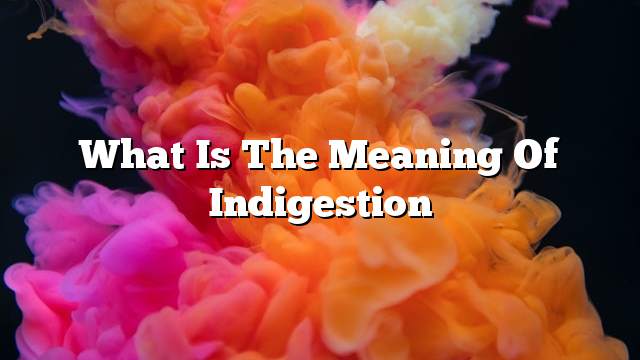Indigestion
Is a term of medical terminology called a human condition, which has many symptoms, from the presence of persistent pain and chronic in the upper region of the abdomen, and the feeling of fullness of stomach and abdomen before the process of satiety, and the presence of bloating, gas, and burgeoning a lot, and also accompanied by nausea and heartburn in the stomach And the esophagus. And indigestion is immune to certain diseases that affect the stomach, esophagus and colon. For example, if a person has an infection in the stomach due to stomach ulcers, or malignant bacteria, it becomes indigestible, and if the person suffers from GERD also indigestion. But the most important reason for indigestion is a disorder in the movement of the stomach, and delay in emptying the contents of food to the intestines, causing indigestion. There are also psychological factors that cause indigestion, such as depression and anxiety, and this increases the state of illness as a result of continuous thinking of the disease, and there are reasons due to bad eating habits, especially food that needs to wash, and eat some foods containing chili.
Symptoms
- Feeling of burning, pain in the stomach, behind the rib cage.
- Feeling bitterness and strong acidity in the mouth.
- Strong desire for vomiting.
- Drying continuously, accompanied by gas out of the mouth.
- Suffering from constipation or diarrhea.
- Feeling anorexia.
- Feeling bloating in the upper region of the abdomen.
Reasons
There are many reasons for indigestion, often related to lifestyle, eating, drinking, or using certain medications. The most common causes of this condition include:
- Over-eat, or eat and drink quickly.
- Eat fatty and spicy foods.
- Get plenty of caffeine, which is found in many foods and beverages, including chocolate, coffee, and soft drinks.
- Smoking.
- Anxiety.
- Use antibiotics, certain analgesics.
- Use iron supplements.
Diseases caused by
Diseases and digestive disorders can cause indigestion, and include:
- Peptic ulcer.
- Celiac disease (abdominal disease).
- Gallstones.
- Constipation.
- pancreatitis.
- Intestinal obstruction.
- stomach cancer.
- Lower blood flow to intestines.
Treatment
If the patient suffers with dyspepsia of peptic ulcer, it must be treated ulcer to get rid of indigestion, and the best treatment is triple treatment of the ulcer. The doctor should also review the medications that the patient is taking. One of the medicines taken by the patient may cause indigestion. In this case, the patient’s medication should be modified. The patient may need further laboratory tests, radiology and possibly gastrointestinal endoscopy to determine the cause and treatment of indigestion.
Alternative natural remedies
Dietary supplements can be adapted by natural dietary therapy, and it is important to do this after diagnosing the natural food processor for best results. For example, you may consider taking supplements, such as digestive enzymes that help to treat indigestion, or peppermint oil capsules, a gas repellent, and increase the acidity of the stomach, thus reducing the symptoms of indigestion, such as gas, bloating, abdominal pain, that. The cause of many problems in the digestive system lies in the various dietary sensitivities, namely the sensitivity of milk and its derivatives, grains, eggs, and so on. In the treatment of indigestion, foods suspected to be allergenic are removed and the process of food consumption begins to be monitored to detect the type of food that causes allergies.
Prevention
There are things to avoid so as not to aggravate indigestion, including:
- Stay away from smoking.
- Do not eat immediately before sleeping.
- Weight loss if excessive.
- Avoid foods that increase indigestion such as fat, spicy foods.
- Keep away from stress.
- Avoid painkillers as much as possible.
- Exercise helps it to heal.
- Reduce food in one meal, and distribute food on five or six meals a day.
